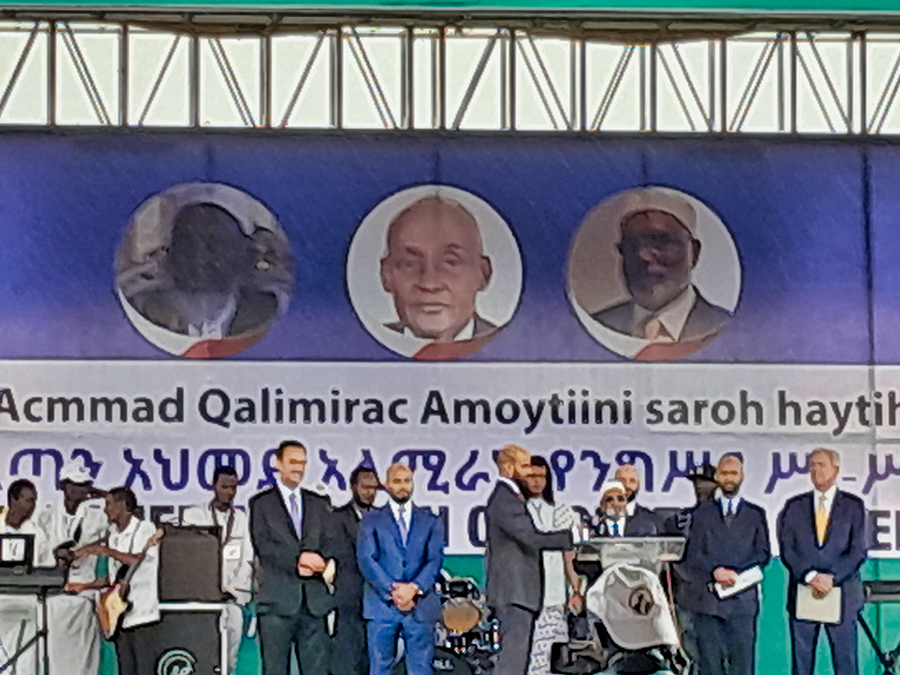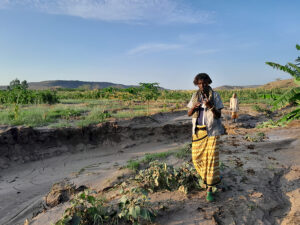Alerts amid Good News
March 21st 2023
Strange rains welcome the new Sultan
With all the traditionally – known characters of December/ January winter rains, almost the entire Region has had a relatively good soaking starting from March 11th. Rain actually continues as of March 20th, now showing signs of waning. For the traditional meteorologists, this was indeed belated winter rains since it fell in soaking patterns even in Eli Da’ar and Kori where thirst had set in as of late January. However, beyond Eli Da’ar on the Eritrean border, the land got a bit of a drizzle but not more. Dallol leaders today report no useful rain and community thirst of 5 sub-districts bordering Tigray – from the Afar side, there is no road access to these people and, according to their district head, people are going up to 100 kilometers (2 days’ walking) with camels to collect water.
On the other side, for the traditional Afar who flocked to the previous capital and historic town of Assaita to join the celebrations, the rains were God’s welcome for the 15th Sultan of Awsa as inaugurated on March 13th following the death of his older brother, Hanfare some 3 years ago. The Awsa Sultanate while being historically recent compared to that in Djibouti and in Eritrea, holds traditional and religious sway for the majority of the Afar population in Ethiopia.

Thus dignitaries from Sultanates of Tadjoura in Djibouti and Rahayto in Eritrea attended along with embassy representatives, UN authorities and Ethiopian government representatives.
Talking enthusiastically on the need for brotherly unity and peace condemning the recent conflict as pointless, the essential place for education in the society leading to a healthy, productive society, the Sultan went on to say that traditions followed in the past that actually harm people, particularly girls and women should be stopped. The good traditions, he said, should be upheld and enabled, binding the community to cohesive development.
Then speaking of the bad habit of chewing Kaat, the Sultan thoroughly denounced this as in every way destructive. Indeed, he delighted his audience including APDA, and, as is planned to hold a further discussion with the senior clan leadership after the fasting month of Ramadan, the organization is encouraged to invite him to chair it. In January, discussion had reached to an overall clan agreement that ancient traditions and practices could and should be reviewed in light of the current era and that clan leadership should direct communities to productive, peaceful lives.
Ongoing nutrition and health crisis
The measles and whooping cough outbreak starting in December is proving extremely hard to control: in the recent 2 weeks, APDA vaccinated 5,548 children in Sifra and supported the government to vaccinate in adjoining Uwwa. Too in Geega, Dagaba and Saha of northern Dubte that link to Sifra and Uwwa, APDA walked house-to-house to vaccinate having been alarmed by the death of 11 children overall from measles. The newly – declared and extremely poorly accessible district of Mabay is in process to receive all 10 routine vaccination antigens, health workers walking over 80 kilometers to cover the community. These efforts may now slow down the spread but the outbreak has gone into the newly – reclaimed districts in eastern and southern Afar Region calling for more on – foot house-to-house vaccine campaigning using the APDA-devised mobile cold chain. Malaria had subsided but now with the rains will again endanger the most vulnerable particularly malnourished children and mothers.
In the face of the most disproportionate, inflated market, malnutrition remains in the most remote communities. Again this demands the ongoing response of APDA’s health workers since the government and other NGO health teams do not walk to such people. Some of these communities such as in Teeru, Konnaba, Magaale, Erebti, Afdeera, Obno on the border with Djibouti, in Mogorres in Bidu on the Eritrean border and in Buuramudayto people are walking up to 3 weeks with camels to access markets while the herd is severely depleted through droughts and conflict. Upwards of 35% of all under 5 years have malnutrition and 60% of pregnant/ lactating mothers. Through all this, the hygiene and sanitation must be maintained, as these malnourished communities could not be more susceptible to waterborne diseases. Cholera still lurks around the corner in Somali and Oromo Regions.
Stepping out of destitution through horticulture, market and livestock support.
APDA’s overall strategy to confront the food insecurity described above is to mobilize local communities to produce food crops where water is adequate to maintain the crop production, this activated alongside local market stimulation that food crops can be affordably bought from cooperatives, eaten adding micronutrients to the diet and the local economy revived.
This strategy goes parallel with the support of the herd: treating animals that outbreaks do not further decimate the already weakened herd and re-stocking to the most destitute in the community that they can resume their livelihood. The organization is currently assisting 180 households zeroed of all assets during the conflict in Guulina and Awra and is also looking to support more destitute households similarly in Magaale and Erebti. Receiving breeding goats that are either lactating or pregnant, the household quickly gets milk for the most vulnerable and goes on to resume life as herds-people.
In support of food-crop growing, the organization has just graduated its first 60 trainees in horticultural and marketing skills in the newly – established horticultural plot/ training center between the main towns of Logya and Samara, Quxxuxayto. 45 women and 15 youth coming from 3 rural sites got 60 days theoretical and practical training, the Samara University Agriculture and Dry-land Faculty enhancing with advice and support. Trainees went home with hand-tools, seeds and seedlings, one woman from Hafaalu in Mille declaring her eyes were now open to a much wider perspective than just her home. She says she intends to involve the relatives and neighbors in learning what she now sees as the means of securing her household, settlement and the wider community. The subsequent training course of another 60 such people starts in a week, this group including 15 women and 5 youth from a community now enabled to involve in horticulture but as yet to start in northern Dubte. The plan is to roll this opportunity onto 24 communities in 2 years and then to keep going, bringing beginners into the fold of agro-pastoralism as well as building up the skills of those already participating.
One of the best examples now is Woleedu on the banks of the Awash River. The Issa/ Somali insurgents having long used the site to re-group and attack herders in Mille and ‘Adda’ar, Afar freed the site in January 2019. Choosing the site that April 2020 meant clearing 25 hectares of the deep-rooted weed – shrub, prosopis juliafora. Having achieved that from sheer hard work, the site was turned into an immediate farm producing maize to feed the displaced communities who had come to live on this newly restored Afar initially supporting 50 women (1/2 hectare each). Using a solar-powered pump and extensive irrigation piping, water was sucked from the Awash River to the plots. While still facing the challenge of the ferocity of the Awash when it is in flood, today it is an amazing green oasis full of nearly every variety of fruit tree and vegetable. Arhoyta, a 30 year old who fought to free the site is now the local leader as well as a precision-planner in horticulture. He is even experimenting with 6 young coffee seedlings and has plenty of pawpaw, bananas and water melon to reach the coming Ramadan market demand. The cooperative number is now up to 120 members, mostly women who farm as well as herding their goats. Arhoya’s enthusiasm infectiously ignited Hussein’s imagination in Guhum, another site taken back from Issa/ Somali intruders. Hussein actually gathered tomato seeds from a friend enjoying a salad – lunch in Mille, dried the seeds and planed them. Unlike Woleedu, till now, Guhum has no water supply so Hussein walked 2 hours daily to collect water in a jerrican for his experimental crop – the result looks promising:


Afar herdsmen re-take grazing land lost for almost 4 decades
– Good news amid an ongoing struggle
Probable 300,000 or 50,000 Afar households have moved into land taken back from the Issa/ Somali combatants in the last 3 years, the majority coming after the Djibouti Road cutting through the Region was eventually freed of Issa aggression. This then now makes up 3 of the 4 declared districts in the newly marked out Zone 6 or Maahe Zone along with a new district in adjoining Gawwaani and several new sub-districts extending east out of all of the Zone 3 districts down as far as Awash/ Fantaale. In fact, vast grazing land for 280 kilometers east and west of the Awash road is now back into Afar pastoralist hands, the Issa/ Somali contraband towns of Gaddamayto, Adayto and eventually Unda Fo’o brought under Afar control. Issa herdsmen have now moved off toward Dira Dawa but still act to menace the new settlers raiding herds as happened 6 nights ago from Guhum where 4 women left guarding their houses lost over 300 goats and sheep together. For the most part, women and children are in the put-together shelter fending for themselves, men still in the frontline some 30 to 50 kilometers away.
First-up, urgent needs
In visiting various settlements, talking to the government and community leadership as well as women in their homes, the most startling thing is the overall need for water. Almost the entire land has no developed water reservoir or scheme Issa herdsmen having had depended on rainwater.
Second comes food and shelter then health and education. To take and retain the land of their fathers and grandfathers, Afar families have come from almost all the districts of Afar Region to live in this now pristine land of grasses, beautiful indigenous shrubs in a landscape of ancient volcanic lava and the old volcanic peak of Eyale that towers east of Gawwaani town.
In order to put this into historic and geographic perspective, a second such update is written, likewise descriptive photos are available on our webpage describing how new settlements are surviving/ struggling to survive. APDA’s webpage is in process to come up again but all needed photos can be supplied in advance.
